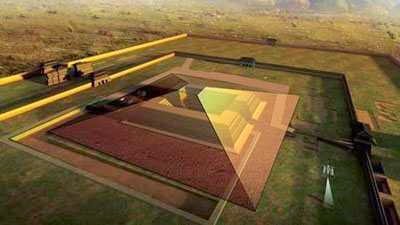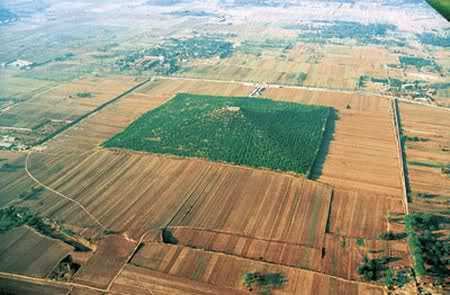Source
This great discovery of the twentieth century remains a more famous mystery of recent decades. "It's like having a gift packaged at home, knowing that inside is what you crave most, and not being able to open it," says one of the technicians.
It is not for less. The mausoleum of the man who unified the Empire of the Center remains intact for more than 2,200 years inside a pyramid of three floors and 76 meters high, covered with earth and preserved by a complex drainage system. Although it is not known under what conditions the bodies of the emperor and his court are found, and one of those responsible for the excavations of the terracotta warriors, Duan Qingbo, considers that they will have rotted; Ancient writings detail how its interior hides treasures of incalculable value that surely have remained in as good condition as the 6,000 statues found so far. But the books also describe traps that could hinder the opening of the crypt.
In fact, the complex, located 30 kilometers east of Xian in the northwest of the country, houses more than 400 tombs covering the impressive surface area of 60 square kilometers. In him they worked more than half million workers during 38 years, following a meticulous plan that tried to reproduce to scale all the well-known China.
The main chamber, where the emperor's tomb is, has never been opened. The Chinese government, according to the recommendations of the archaeologists working in the area, does not allow it to be opened and examined until it is in possession of the technology that allows it to safely prevent whatever is inside from spoiling. It can be years, decades or centuries until that happens.
But then, how do we know what is inside the tomb? The answer is called Sima Qian. The considered father of Chinese historiography lived between 145 and 86 a.C. and he wrote a general history of the kingdom that spans more than 2,000 years in retrospect from his own time.
Known as Shiji (Historical Records), it had been started by her father Sima Tan, and Qian completed it in the year 91 BC, about five before her death. It tells the story of the construction of the great mausoleum, the burial of terracotta warriors and gives concise data, such as the number of 700,000 workers involved in the colossal work.
When their writings were examined by Western historians they were taken with much skepticism, as exaggerations and even mythical legends without historical basis. This was partly justified because Qian usually presents legendary and even mythological figures of Chinese history as historical facts, assigning precise chronologies to them.
Nevertheless the archaeological discoveries of the last decades have confirmed many of the affirmations of the Shiji, like the terracotta warriors and the situation of the tombs of other rulers. So Qian's claims are made today with great caution, and hence the reluctance to open the tomb of Qin Shi Huang.
Because nobody knows exactly what's inside, but Sima Qian says that in the great underground palace, which is larger than a football field, there is a scale reproduction of China known at the time. Including more than a hundred rivers, lakes and seas. A kind of microcosm where, instead of water, large amounts of mercury would have been used to simulate the flow of rivers.
No matter how many times they have been seen in photographs. Naturally, the terracotta warriors of Xi'an put on goose bumps and are worth almost 20 euros from the entrance. What is most striking is the sensation of witnessing an archaeological site that is alive, and that may not reveal all of its secrets ever. Definitely, it takes a Indiana Jones of the 21st century.

I hope you enjoy my publication and see you in the next to continue sharing with all of you !!!!!!!!!!!@brianrg13!!
.jpg)
"Every achievement begins with the decision to try it." - Gail Devers.




I read that there are precious gems in the ceiling that reproduce the night sky.
I would love to be the second guy to visit,
leave all the traps for the first guy!